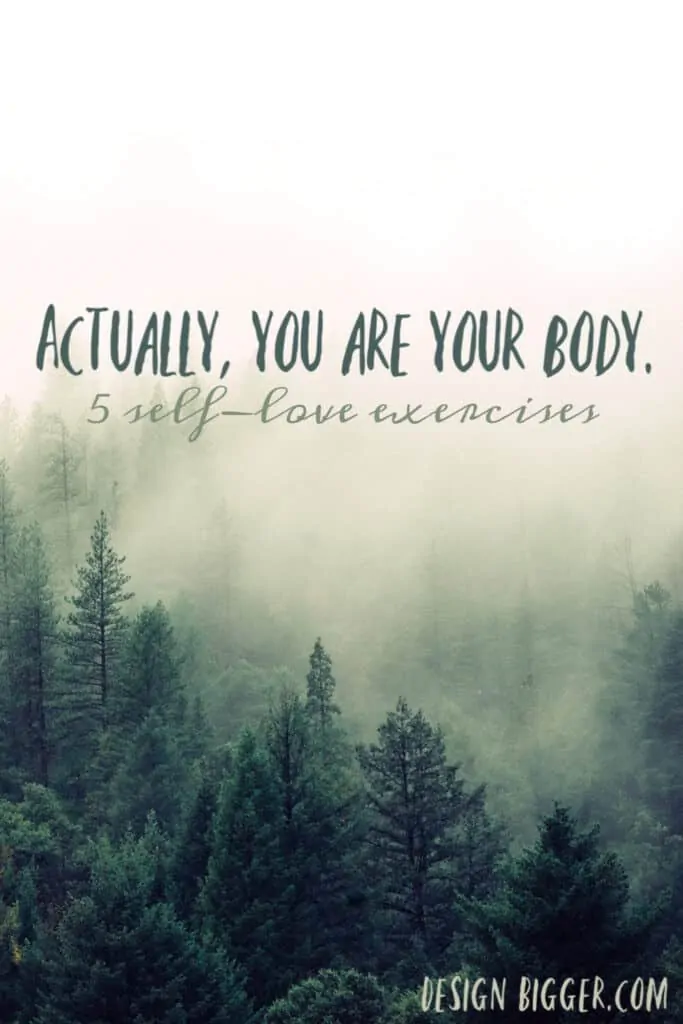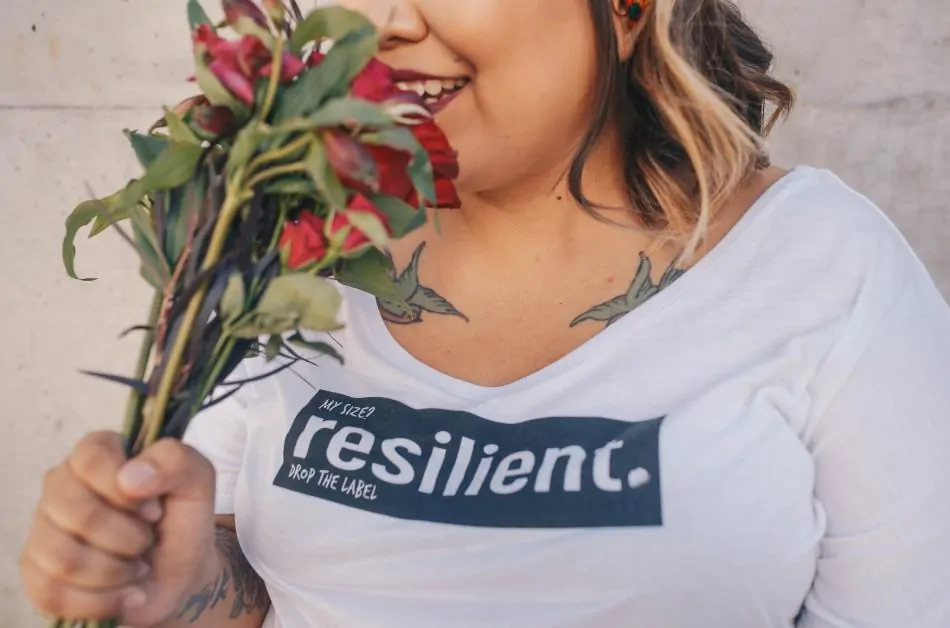“You are not your body…” said every health coach ever. I disagree. In fact, if I could, I would punch them in the face. O at least, verbally….with patience and kindness.
Why?
Because they’re wrong.
Or, at least, they’re telling a harmful half-truth.
For years, millions of women and women have been told that they have worth no matter how their body looks. Which is true. Whether you are obese, skinny, crippled, mentally unhealthy, or “average”, you have worth and deserve to be happy. However, this is not what the message “You are not your body…” conveys.
On the surface, this message seems body-positive…but it’s not. It’s actually subversive and undermines self-love and body positivity.
Another way to say, “You are not your body” would be: “Your body is obviously crappy but it doesn’t necessarily mean that you are.”
Not the message that someone who is plus-size wants to hear.
Self-love has never come by hiding or abandoning part of ourselves. Especially our body, a crucial and wonderful gift that houses and transports our sense of self. True self-love comes through accepting and loving all of ourselves. Even parts of ourselves that other people find odd or which make them uncomfortable. This leads us to the need for self-love exercises!
By the way, if I could change the mantra, it would become: My body is part of who I am, and my body is amazing.
5 Self-Love Exercises with Applications
While we’re talking about phrases that aren’t my favorite, I have never been a fan of the saying, “Fake it ’til you make it” either. I really believe that real change or achievement of anything worth having can only come by being genuine.
My preferred way of stating a similar idea is Action Precedes Motivation.
To me, this has always meant that I need to do things before feeling like doing them. I hate to use the gym as an example, but you should never wait until you feel motivated to go to the gym. You should go to the gym consistently and just observe the motivation well up inside you.

Similarly, you may have to love yourself before you really feel like it. Research shows that not only do happy people smile but intentionally smiling when you’re not happy can actually improve your mood!
Now, if we apply this to self-love, there is one important distinction. Smiling is something you do to show other people you are happy. Other people don’t need to know how much self-love you have or don’t have. Rather, you need to act like you have self-love on the inside.
Thinking positively and treating yourself kindly internally will change the way that you think until the day that…Surprise! Acting as if you love yourself has actually created a huge amount of self-love and appreciation. But how do you act like you have self-love? Well, let’s talk about a few self-love exercises that you can employ in your life.
Before we charge on, however, do note that these aren’t meant to give you a temporary high. If you are in a rut or a funky mood, there are things to do to break out of them. However, these ideas are bigger. These are self-love techniques that are meant to transform your mental state and increase your self-love over time.
1. Treat yourself like someone you love

Psychiatrist and Youtube phenom Jordan Peterson suggests that, if you want to have a good life, try talking to and treating yourself like you are someone that you love and want the best for. Let’s say there is someone who calls you because they are feeling really down on themselves and don’t know what to do.
What do you do?
You don’t berate them, you don’t tell them that everything would be better if they’d just stop sucking and clean their house, etc. You would listen, provide comfort, and give them genuine advice about what you think they could do to improve their current lot.
As an extension to this, say someone you love is really struggling with accepting their weight and is having self-worth issues, so you invite them over for dinner. You know it is important to them to lose weight, so what do you make them? Pizza with ice cream for dessert? Hopefully, you would be sensitive to their needs and desires and create a meal in line with them.
While these seem like obvious examples when it comes to others, we often don’t think this way when it comes to ourselves. Instead, we try and make ourselves do things by guilting ourselves, berating ourselves in our heads, and, in essence, being a personal slave-driver.
So, if you were someone you love and wanted to have a good life, how would you talk to yourself? What would you remind yourself to do during the day? Would you kindly suggest to yourself that you skip the doughnuts in the breakroom?
Remember, you are a valuable person and you should treat yourself as such. Otherwise, you might just fool your brain into thinking that you’re not worth self-love.
To Do: Write a letter to yourself, explaining your current life or situation. Then respond, kindly advising yourself what you’d like yourself to do.
2. Avoid Toxicity
Just as light chases out darkness, bringing positivity into your life would hopefully drown out the negative influences we all have. However, this probably won’t be true. At least at first. When your self-love is in its infancy, it needs to be protected from influences that would wilt or uproot it. Meaning that you should not let it face the darkness of negativity whenever possible.
What negative influences do you have in your life? Personally, I have a family member that always leaves me feeling poorly about myself. Whenever we talk, I am left feeling like I have been weighed, I have been measured, and I have been found lacking. So what could I do?
Since I didn’t feel good about cutting this person out of my life for various reasons, I sat down and gave myself some caring advice. What amount of interaction could I have with them that I would feel good about? I ended up interacting with this person only at large family functions and when other people were around. They didn’t feel like I had snubbed them (they didn’t even notice), and I was able to continue cultivating my self-love.
Identifying the sources of your discomfort is probably not hard. Deciding if they are harmful to your self-love and then removing them is the difficult part, so let’s start with an area from which nearly everyone ingests a huge daily dose of toxicity.
Social media, at its root, is a machine for you to compare your life to the lives of others. Every time you scroll to a new post in your Instagram feed, you have another chance to compare your life to the online life of someone else. Scroll…compare….scroll…compare….
Unfortunately, social media is not real life. Nearly everything you see is fabricated or twisted in some way. While your friends probably aren’t twisting things with any malicious intent, that work for party they took pictures at was probably not nearly as fun as they’re making it sound. Now you’ll have to trust me here, if you have any problems with self-worth, comparison is the death of happiness.
So we need to find a way to stop comparing ourselves to others on a constant basis. Now, I’m not suggesting cutting out social media entirely. Connecting and networking can be very good for self-worth and happiness. The key is to use social media as a tool to accomplish what you want it to. To use it intentionally.
To Do: Social Media Detox. Go without social media for a week and then invite it back into your life on your terms. Choose what you want social media to accomplish for you and how it could do that.
3. Build your confidence through self-efficacy
Albert Bandura was a psychologist who put forth the idea of self-efficacy which, simply stated, is a person’s belief in their ability to succeed in specific situations or accomplish certain tasks.
Stated even more simply, self-efficacy is believing in yourself.
When it comes down to it, almost nothing in this life can be certain. Your brand-new car could be totaled tomorrow. You could be let go from your job of 20 years without notice. Your apartment complex could be sold to new management and everyone evicted….knock on wood.
The only thing you can trust or depend on, therefore, is your own ability to succeed or deal with obstacles. To know that if your car has an issue, you can deal with it. If you’re fired, you can figure out a way to make things work. If the world were to end, you would find a way to survive.

One of the best ways to build this self-efficacy is to accomplish specific goals that you value.
When I was in college, I managed a residential treatment center for teen boys with high-functioning autism. We would take nerdy, unathletic boys whose main accomplishment had been sitting on the couch and playing video games for 60 hours a week and strap them into a rock climbing harness. To their surprise, they were able to climb up a rock wall! (we chose easy ones…) And then they started to think, “well that was pretty cool. I wonder what else I could do if I actually tried?” Eventually, many of these boys ended up going to college, developing “normal” hobbies, and holding down jobs. All because they accomplished goals that built self-efficacy.
There is some value in accomplishing goals that other people think are valuable. If you meet a quota at work, for example, it will do a limited amount to build your self-efficacy. However, there is much more value in finding something that you value and working at it to accomplish a goal. Hence the term “self-love exercises“.
To that end, our assignment here is to sign up for a class to learn a new skill or to learn about a new subject. Don’t fool yourself into thinking you’ll just read about something new. It needs to be structured. Now, it doesn’t have to be with other people. If you want to take a class with people, go for it! Otherwise, find an online course, register for a class on udemy, or find someone to private tutor you in a new skill. What it is doesn’t matter, as long as it’s valuable to you and you can measure your success.
To Do: Sign up for a class that teaches a new skill that you want to learn.
4. Make your inner voice and your actions congruent
If self-love had enemies, they would be self-loathing and self-indifference. Believe me, being passive about the way you think of and treat yourself will lead you nowhere good. But that’s a subject for another time. Self-loathing, on the other hand, is a subject for now.
The main source of self-loathing is when we act in a way that is not congruent with how we think we should act. For example, you “know” that you shouldn’t yell at your kids. You yell at your kids… self-loathing. You know you shouldn’t eat that candy bar…you eat it. Self-disgust and loathing.
However, it is important to note that your inner voice is not always correct (more on this below..) In fact, your inner voice is the conglomerate of not only all the good things you’ve learned but all the brainwashing and subversive messages which you have been subjected to your entire life. Why do fat people loathe themselves? Because society has told their inner voice that they need to diet, work out, and be skinny to be attractive or lovable. Their inner voice is happy to parrot that line and, if any of those things don’t happen, self-loathing ensues.
There are two main areas that cause us to be disappointed in ourselves: acts of commission and acts of omission…meaning doing things you know (or think) you shouldn’t, and not doing things that you know (or think) you should.
One of the convenient things about being human is that we somehow know what we need to do. If you are experiencing any sort of disquiet in your life, you probably know what you need to do about it. If there is something making you anxious right now, you know what your little inner Jiminy Cricket is telling you to do. Go and respond to that email. Call your daughter. Stop smoking. Don’t watch pornography. The list goes on and on.
To Do: Before going to bed tonight, identify something that you know you just need to do and have been putting off. Then do it.
5. Go to war with the monkey
If you have read many self-help books, you are probably familiar with the term Monkey Mind. Your monkey mind is the chattering little fellow in your head that serves you up an endless stream of thoughts during the day…most of which you didn’t ask for and don’t want. If you have ever spent the night awake worrying about bills, relationships, kids, your appearance, etc. it is an all-too-obvious truth that we don’t control our own subconscious.
Now, I don’t claim to be a zen master that can control exactly what my brain thinks about all the time, and I don’t have a way for you to do that either. Instead, it is important to acknowledge a few different truths about our brains and how they work:
- Your brain is meant to keep you alive, not make you happy. Because of this, it is constantly playing out what-if scenarios and looking for potential threats. Most of these are not real and never will be. If your brain is serving up something that you don’t like, ask it, is this reality?
- Your mind is a stage. You may not be able to choose what plays, but you can choose what you pay attention to and what you bring back for another show.
Now that we understand those two things, the first step to controlling your mind and thoughts is to simply become aware of them. Acknowledging thoughts for what they are is typically enough to keep them from hijacking your emotions. For example:
Monkey Mind: “That cute guy totally thinks I’m fat.”
Conscious Thought: “Oh hello, monkey mind. You know, that’s probably not true and I’m not going to think about that. Instead, what if I say “hi” to him next time I see him.”
Much like a regular monkey (or chimpanzee I guess), your monkey mind is trainable. If you take those thoughts and reframe them enough times, eventually your subconscious will start serving you some more palatable thoughts.
To Do: Identify a negative recurring thought pattern you have and come up with a way to reframe it or bring it to your own attention. Will Bowen’s Complaint Free Exercise is a perfect example of this. You put on a bracelet, and every time you notice that you are complaining, you move the bracelet to your other wrist.
Bonus Self-Love Exercise Tip: Get a Self-Love Journal
I hope these self-love exercises have been helpful to you. Or at least, have been inspiring to you and you can see how they will be helpful in your long-term goal of self-acceptance and love.
In the meantime, remember, you are amazing. You have accomplished much and have much more to give the world.
Have an amazing day!








Comments are closed.